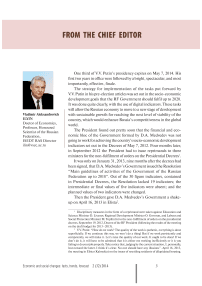From the chief editor
Автор: Ilyin Vladimir Aleksandrovich
Журнал: Economic and Social Changes: Facts, Trends, Forecast @volnc-esc-en
Рубрика: From the chief editor
Статья в выпуске: 2 (32) т.7, 2014 года.
Бесплатный доступ
ID: 147223583 Короткий адрес: https://sciup.org/147223583
Текст ред. заметки From the chief editor
One third of V.V. Putin’s presidency expires on May 7, 2014. His first two years in office were followed by a bright, spectacular, and most importantly, effective, finale.
The strategy for implementation of the tasks put forward by V.V. Putin in his pre-election articles was set out in the socio-economic development goals that the RF Government should fulfil up to 2020. It was done quite clearly, with the use of digital indicators. These tasks will allow the Russian economy to move to a new stage of development with sustainable growth for reaching the next level of viability of the country, which would enhance Russia’s competitiveness in the global world.
The President found out pretty soon that the financial and economic bloc of the Government formed by D.A. Medvedev was not going to work for achieving the country’s socio-economic development indicators set out in the Decrees of May 7, 2012. Four months later, in September 2012 the President had to issue reprimands to three ministers for the non-fulfilment of orders on the Presidential Decrees1.
It was only on January 31, 2013, nine months after the decrees had been signed, that D.A. Medvedev’s Government issued the Resolution “Main guidelines of activities of the Government of the Russian Federation up to 2018”. Out of the 30 figure indicators, contained in Presidential Decrees, the Resolution lacked 19 indicators; the intermediate or final values of five indicators were absent; and the planned values of two indicators were changed.
Then the President gave D.A. Medvedev’s Government a shakeup on April 16, 2013 in Elista2.
Almost every month, painstakingly, publicly, through critical remarks, the President showed his dissatisfaction with the performance of D.A. Medvedev’s Government on the implementation of strategic tasks of Russia’s socioeconomic development, defined in the preelection articles and set out in the Decrees of May 7, 2012. The President’s position and the logic of his actions are understandable, since it is only the fulfillment of his election programs, significant improvement in the quality of life of the main social groups, provision of citizens’ security in the broadest sense, stability in social and economic sphere that will allow V.V. Putin to run for president in 2018.
Today, the majority of open-minded international experts, the majority of the public, scientific community and experts note the following:
– Russia’s achievements over the last two years in the international sphere are significant, first of all – its role in the stabilization of the crisis in Syria;
– power vertical in all the regions has been preserved and strengthened, despite obvious problems in the financial and economic block of the RF Government;
– Sochi 2014 Olympics, the largest national project for the last 30 years, was well-prepared and implemented.
Brilliant organization, excellent security and impressive sport performance at the Olym-pics filled the most part of the population with pride that Russia was able to show the world its skills in organization, preparation and hosting of the best Olympic Games in every respect.
The euphoria after the Olympic and Paralympic Games was replaced by a growing concern due to the man-made crisis in Ukraine.
It should be noted that composure, demonstrated by the President, facilitated the smooth accession of Crimea and Sevastopol (the territories that had been part of Russia historically) to the Russian Federation; all the necessary procedures were carried out in six days:
March 16 – Referendum on the accession of Crimea and Sevastopol to the Russian Federation;
March 18 – Address by the RF President to the Federal Assembly with a request to consider a Constitutional Law on the creation of two new constituent entities within the Russian Federation;
March 21 – the Law was signed.
With this swift “finale” V.V. Putin established the Russian Federation in its new capacity as a country that has its own national interests, a country that wants to defend them and is able to do that.
Such an active position of the President and these results of recent months have caused the rise of patriotism among the most part of Russia’s population.
According to all sociological polls in March, more than 80% of the respondents strongly approve of the actions of the head of state3, the indicator is 17 points higher than in February.
The international situation around the Eastern regions of Ukraine remains very complicated. The Geneva Conventions offer some hope, but, obviously, it is only the beginning of a difficult path to their implementation.
Let us hope that the RF President’s composure will not fail this time as well.
If we speak about the next intermediate stage, it seems that for V.V. Putin it could be May 7, 2016, when two-thirds of his presidency expire, and by this time it is extremely important for the President to update the political elite, by eliminating the influence of its “quasi-patriotic” part4, to introduce considerable changes in the government team through ideologically compatible professionals, who work to achieve the common ultimate goal – to fulfil the strategic tasks set out by President V.V. Putin that are aimed at the country’s development by 2018, and at the same time to adjust socio-economic mechanisms so that the electorate would see the moving of the state towards social justice, the rule of law for all the population groups, and that the voters would feel a gradual improvement of the quality of life in their family, city, and country.


